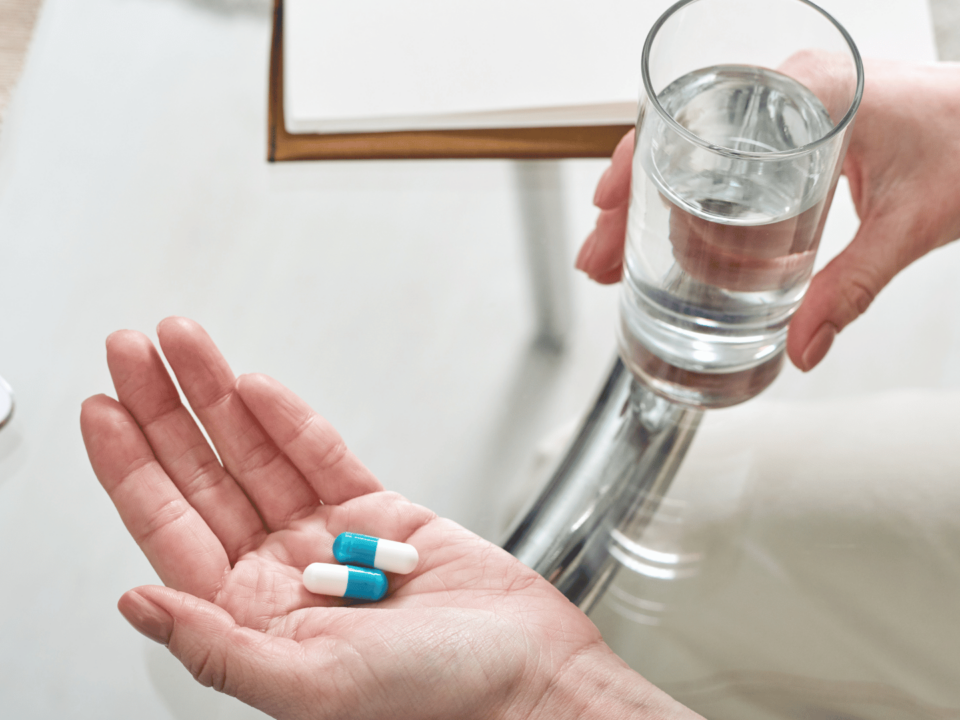What Affects How Well My Parkinson’s Drugs Work?

Drug Molecule Targets Early Onset Parkinson’s Disease
19th May 2025
Support Group Round-up May 2025
30th May 2025What Affects How Well My Parkinson’s Drugs Work?

What Affects How Well My Parkinson’s Drugs Work?
What you eat, constipation and medications you may take for other conditions can affect how well your body absorbs your Parkinson’s drugs. Here we look at ways to make sure you get the best from your Parkinson’s medication.
Levodopa and protein
Diet can affect how well your Parkinson’s medication is absorbed. For some people with Parkinson’s, protein seems to interfere with how well levodopa medications are absorbed in your body. Protein is found mainly in meat, fish, eggs, cheese, beans and pulses.
Because of this, it may help to take your medication on an empty stomach 30 minutes before you eat a meal with protein in it, or a minimum of 60 minutes after a meal.
Other things that might help:
- Having most of your daily protein in the evening can help your levodopa medication work better in the daytime, when you’re likely to need it more. This is known as the protein redistribution diet and should only be tried after consulting an accredited dietitian.
- Reducing the amount of protein you eat earlier in the day may help to increase the response your body has to the medication. This can help avoid unpredictable muscle fluctuations.
Protein is an important part of a healthy diet. It can help you maintain your muscles and strength, and fight infection. So it’s important you don’t stop eating it altogether.
If you would like to review the timing of your protein intake, you should talk to your GP, specialist or Parkinson’s nurse, or ask to see an accredited dietitian.
Constipation
Constipation is common in people with Parkinson’s. It can be caused by a number of things, including slowness of movement and rigidity.
These Parkinson’s symptoms can affect the muscles in the bowel wall, so food isn’t moved along in the bowel. This causes constipation.
If you experience this symptom, it often means your body isn’t able to absorb your Parkinson’s medication properly. This can lead to your symptoms getting worse.
Many people with Parkinson’s find that delaying having a large meal until an hour or two after taking their medication can help with drug absorption and improve their symptoms.
Some medication makes constipation worse. It might be your Parkinson’s drugs or other types of medication, such as antidepressants or prescription painkillers. Speak to your GP, specialist or Parkinson’s nurse for advice if you’re worried about this.
Indigestion and heartburn
Antacids are used to relieve heartburn or indigestion. They shouldn’t be taken at the same time as your Parkinson’s drugs as they may affect the absorption of your medication.
If you do experience heartburn or indigestion, speak with your GP, specialist or Parkinson’s nurse, who can advise on treatments.
Other types of drugs you may take
If you have Parkinson’s, it’s likely you’ll have symptoms that don’t just affect movement. These are known as non-motor symptoms, and include things like anxiety, pain or fatigue.
Treatments for the non-motor symptoms of Parkinson’s are normally the same types of drugs that anyone might use or be prescribed. For example, you may be prescribed a drug called Movicol for constipation. But some medication can interfere with how Parkinson’s drugs work. This means that a particular drug can become weaker or stronger.
Whoever prescribes you new medication should check what you’re already taking. And before you take something, it’s always good to double check with your specialist, Parkinson’s nurse or pharmacist whether there are any risks. This includes over-the-counter medication, such as:
- Cold and flu remedies. These can stop your Parkinson’s medication working properly. This is especially important to remember if you’re taking selegiline, rasagiline and safinamide. They can also increase the risk of side effects.
- Iron tablets. These can affect how much levodopa is absorbed in your body. If you’re taking supplements, you should aim to leave around two hours between taking the iron tablet and levodopa.
- Anti-sickness drugs. Parkinson’s medication can cause nausea and vomiting. Your specialist will usually prescribe domperidone (Motilium) to prevent and treat this side effect. But some anti-sickness drugs will interact with Parkinson’s drugs.
- Antipsychotic medication. This is used to treat hallucinations and delusions when someone experiences psychosis or schizophrenia. Because antipsychotics and Parkinson’s medication both affect the levels of dopamine in the brain, it’s a delicate balance to keep the symptoms of both conditions well controlled.
If you have any concerns about your medication, talk to your GP, specialist, Parkinson’s nurse, or pharmacist.
Sources:
Parkinson’s NSW InfoLine



